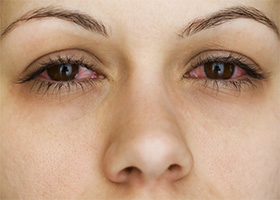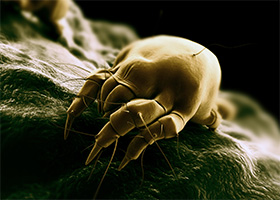Allergy FAQs
What is allergy?
An allergy is the result of your body’s immune system overreacting to a normally benign substance called an allergen, such as pollens, mites, dogs and cats or food proteins. Your body develops antibodies that attach to cells in your nose, eyes, throat, lungs and skin, known as mast cells. Each time you are exposed to the allergen, the mast cells release chemicals, such as histamine and cause an allergic reaction.

Allergy symptoms can vary from person to person, but can have a significant impact on your quality of life. An allergy is the result of your body’s immune system overreacting to a normally benign substance called an allergen, such as pollens, mites, or food proteins. The main types of allergy symptoms include: allergic rhinitis, allergic asthma, eczema and food allergies.
At the earliest signs of allergy, it may be appropriate to visit an allergy specialist to correctly diagnose the allergens triggering the reaction and find the best treatment for you. Beware of unproven methods of testing.
Allergies may be genetic and can change throughout your life. While some people can grow out of allergies, some people develop more allergies. By seeking specialist advice early you may be able to prevent the development of further sensitisations. This is especially important for children, as they may be susceptible to developing allergic rhinitis and allergic asthma later in life, known as the allergic march, a development which may be able to be prevented.
There are allergy treatments which rely on avoiding the allergen, treating the symptoms of allergy or treating the cause of allergy.
Why do some people’s immune systems overreact?
 We don’t know, but research is continuing. The rates of allergies increasing globally may be due to our environment and lifestyles, growing urbanisation, pollution, active or passive smoking and changing diets.
We don’t know, but research is continuing. The rates of allergies increasing globally may be due to our environment and lifestyles, growing urbanisation, pollution, active or passive smoking and changing diets.
The greatest rates of allergies increasing are in developed countries. In Australia, the number of adults and children suffering from allergic rhinitis, also known as hay fever, has doubled in the last ten years. The World Health Organisation ranks allergy as the fourth most common global chronic disease, with one in four people worldwide affected by respiratory allergies, such as allergic rhinitis or allergic asthma.
Are allergies genetic?
Allergies may be genetic. If both of your parents have allergies you have a 40 to 60% chance of also having allergies. However, your environment also plays a role. An allergy specialist can discuss your family history and how children’s allergies may be managed to avoid the development of allergies.
What are the most common allergies?
Allergy symptoms vary from person to person. Allergies can have a significant impact on your quality of life and may be life threatening.

The main types of allergy symptoms include:
- Allergic rhinitis, commonly known as hay fever, is the most common form of allergy. It is an inflammation of the upper airways and eyes and is an abnormal reaction to airborne allergens such as dust mites, pollens and animal dander. Read our fact sheet on allergic rhinitis and allergic asthma to learn more.
- Allergic asthma is the most common type of asthma. Allergic asthma is an inflammation of the lower airways and is also an abnormal reaction to airborne allergens. While allergic rhinitis affects the upper airways, allergic asthma affects the lower airways. Both the lower and upper airways are affected by the same inflammatory process. Read our fact sheet on allergic rhinitis and allergic asthma to learn more.
- Eczema is one of the earliest signs of allergy and often presents at a young age. Eczema is a chronic inflammation of the skin caused by an abnormal response of the immune system. Eczema occurs when the skin barrier is unable to repair damage. The skin then becomes dry and scaly. Allergens can then enter the skin, activate the immune system and the skin then becomes inflamed. Most people with eczema have an associated allergy. Children who have severe eczema tend to develop food allergy, allergic rhinitis and allergic asthma. This progression is known as the allergic march. Read our fact sheet Allergy Development and Changes to learn more. For more information on managing eczema go to www.allergy.org.au
- Food allergies are abnormal immune reactions to certain foods and can be life-threatening. In the past decade there has been a 500% increase in serious food allergy reactions amongst pre-schoolers. Any food may cause an allergic reaction, but the most common allergens are egg, cow’s milk, peanuts, tree nuts, fish, shellfish, sesame, wheat and soy.

Can allergies change?
Yes. People can grow into or out of allergies throughout their life. However, it is important to prevent allergies from developing, by seeking the advice and treatment of an allergy specialist at the earliest signs of allergy.
For children with an allergy, seeking medical advice early can prevent what specialists refer to as the allergic march. Children may have sensitivities to food in the first few years of life, which may then diminish, but then develop allergic rhinitis or allergic asthma. Allergen immunotherapy is a treatment which has been proven to reduce or stop the allergic march and is more effective the sooner it commences. Speak to an allergy specialist for more information and read our fact sheet on Allergy Treatment – Immunotherapy.
How do I find out what I am allergic to?

It is important not to self-diagnose or self-medicate. The only way to diagnose an allergy correctly is with an allergy specialist. To visit an allergy specialist you will need a referral from your general practitioner (GP). The allergy specialist can conduct a range of tests and take a thorough medical history to pin point the allergens that trigger your reaction. Once diagnosed you can discuss clinically proven strategies to successfully manage or treat your allergy. Read our diagnosis fact sheets to learn more.
Beware of unproven methods that claim to test for allergies including cytotoxic food testing, kinesiology, Vega testing, electrodermal testing, pulse testing, reflexology and hair analysis. These tests have not been scientifically validated and may lead you to take unnecessary, costly and in some cases dangerous avoidance strategies.
How can I manage my allergies?

There are three key approaches to managing allergies which include:
- Avoidance. This is often recommended as the first approach. If you can avoid the allergen an allergic reaction will not be triggered. However, it is not always possible to avoid the trigger if it is pollen, dust mites, or a pet you are very attached to. When avoidance is not practical you should discuss treatment options with your allergy specialist. Read our fact sheet Allergy Treatment – Avoidance for more information.
- Treating the symptoms of allergy. There are many over the counter and prescription medications which treat the symptoms of allergies. Treatments may include anti-histamines, nasal sprays and inhalers. It is important not to self-diagnose or self-medicate. You should discuss any allergic reactions with your healthcare professional. Read our fact sheet on Allergy Treatment – Symptomatic to learn more.
- Treating the allergy. In moderate to severe cases of allergy, it may be appropriate to discuss treatment options with an allergy specialist. Allergen immunotherapy may be recommended. This therapy can reduce or stop allergic symptoms. It may also prevent the onset of new allergies, known as polysensitisation and the development of allergic asthma for people who suffer from allergic rhinitis. This therapy is only available through allergy specialists. Read our fact sheets on Allergy Treatment – immunotherapy and Quality of Life to learn more.
